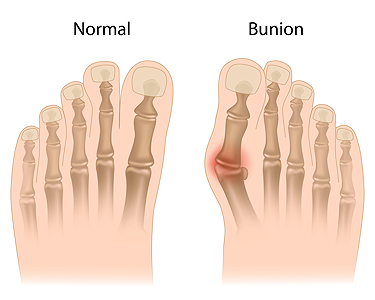
Dr. Kenneth Rosenthal
Dr. Jonathan C. O’Quinn
Dr. Michael J. Price

Dr. Kenneth Rosenthal
Dr. Jonathan C. O’Quinn
Dr. Michael J. Price
 A bunion is a bumpy outgrowth that develops at the joint of the big toe as a result of a deformity known as hallux valgus. The most common symptom is the big toe pushing inward toward the second toe, thereby pushing the joint out of alignment and causing the bump. The main cause is wearing shoes that are pointy or too tight in the toe box. Tight shoes strain the MTP (metatarsophalangeal) joint where the big toe meets the foot. Women are more likely to develop bunions because they often wear high heels. A bunion can also be the result of heredity or arthritis. If you have developed a bunion, it is wise to consult with a podiatrist earlier rather than later. The podiatrist can examine the area and help you decide the correct measures to take. Treatment ranges from elastic bunion pads or shoe inserts in minor cases to surgery in the most severe.
A bunion is a bumpy outgrowth that develops at the joint of the big toe as a result of a deformity known as hallux valgus. The most common symptom is the big toe pushing inward toward the second toe, thereby pushing the joint out of alignment and causing the bump. The main cause is wearing shoes that are pointy or too tight in the toe box. Tight shoes strain the MTP (metatarsophalangeal) joint where the big toe meets the foot. Women are more likely to develop bunions because they often wear high heels. A bunion can also be the result of heredity or arthritis. If you have developed a bunion, it is wise to consult with a podiatrist earlier rather than later. The podiatrist can examine the area and help you decide the correct measures to take. Treatment ranges from elastic bunion pads or shoe inserts in minor cases to surgery in the most severe.
If you are suffering from bunions, contact one of our podiatrists of Eastern Carolina Foot & Ankle Specialists. Our doctors can provide the care you need to keep you pain-free and on your feet.
What Is a Bunion?
A bunion is formed of swollen tissue or an enlargement of boney growth, usually located at the base joint of the toe that connects to the foot. The swelling occurs due to the bones in the big toe shifting inward, which impacts the other toes of the foot. This causes the area around the base of the big toe to become inflamed and painful.
Why Do Bunions Form?
Genetics – Susceptibility to bunions are often hereditary
Stress on the feet – Poorly fitted and uncomfortable footwear that places stress on feet, such as heels, can worsen existing bunions
How Are Bunions Diagnosed?
Doctors often perform two tests – blood tests and x-rays – when trying to diagnose bunions, especially in the early stages of development. Blood tests help determine if the foot pain is being caused by something else, such as arthritis, while x-rays provide a clear picture of your bone structure to your doctor.
How Are Bunions Treated?
If you have any questions, please feel free to contact our office located in Greenville, NC . We offer the newest diagnostic and treatment technologies for all your foot care needs.